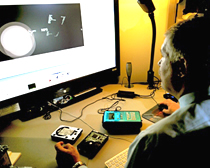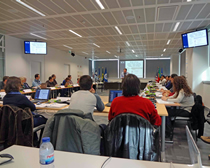Archived Content
In an effort to keep ICE.gov current, the archive contains content from a previous administration or is otherwise outdated. This information is archived and not reflective of current practice.
TOP STORY: ICE HSI personnel help foreign partners combat cybercrime
Instead of tying a gun to a shooter or matching DNA evidence to a crime scene, law enforcement officials have revised their strategy when investigating Internet-based crimes. Victims could be millions of miles away and evidence could be deeply hidden within computer hard drives or programs.
"Technology enabled crimes are on the rise, so investigators have to be prepared when they encounter a computer or other digital device during an investigation," said Cardell Morant, unit chief for the Cyber Crimes Center. "Often the first person to arrive at a crime scene is not a forensically trained agent and one might not be available in the area. In order to ensure the preservation of digital evidence, we have to provide first responders with the proper training and tools."
U.S. Immigration and Customs Enforcement's (ICE) Office of International Affairs and its Cyber Crimes Center, both housed under the agency's Homeland Security Investigations (HSI), developed a 40-hour First Responder Computer Forensics Training course. The course helps law enforcement counterparts across the globe tackle child exploitation, cybercrime and computer forensics investigations.
The most recent training took place in Lisbon, Portugal. Instructors provided attendees with basic fundamentals, techniques and methodology used to identify, search and secure digital evidence for presentation in judicial proceedings. Participants studied methods of production, distribution, receipt and possession of child exploitation material. They also learned how to conduct investigations involving child sex tourism and cybercrime. During the training, participants worked in teams to identify, document, recover and preserve digital evidence using software programs. The training culminated in a five-hour practical exercise designed to test a participant's ability to successfully identify and recover digital evidence.
Participants found the training to be truly beneficial. Representatives from a prosecutor's office who attended the training added that it helped them understand the terminology and methods utilized by the various law enforcement agencies that collect digital evidence. This in turn improves interoperability between investigators and prosecutors.
Thus far, ICE's Office of International Affairs has presented this training to more than 120 law enforcement personnel from Portugal, the Philippines, Thailand, Cambodia, Bolivia, Peru, Paraguay and Brazil.
Learn more about ICE's Cyber Crimes Center and the Office of International Affairs.



